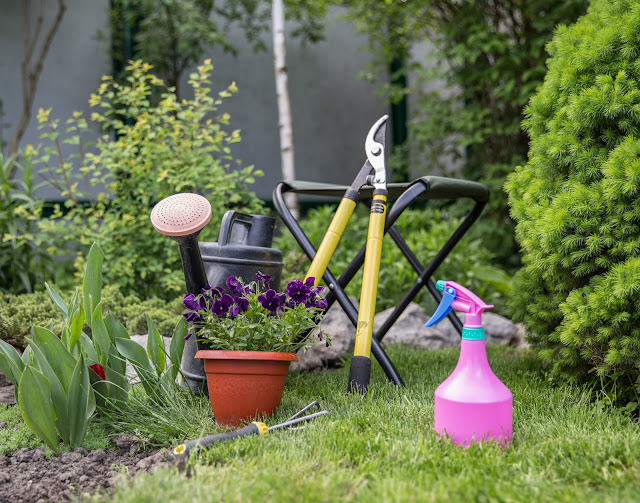Kitchen Gardening : A Beginner's Guide
Kitchen Gardening : A Beginner's Guide
Kitchen gardening, often known as home gardening or container gardening, is a rewarding way for beginners to cultivate fresh produce right at home. It involves growing herbs, vegetables, and even fruits in small spaces such as balconies, windowsills, or small gardens near the kitchen. The beauty of kitchen gardening lies in its accessibility and simplicity; you don't need a large plot of land to get started. With basic gardening tools, quality soil, and a little bit of sunlight, anyone can enjoy the satisfaction of harvesting their own herbs like basil and mint, or vegetables like cherry tomatoes and lettuce, just steps away from their kitchen. Not only does kitchen gardening provide a convenient source of fresh, organic produce, but it also offers a therapeutic and educational experience for gardeners of all ages. Whether you're interested in enhancing your culinary creations or simply connecting with nature, kitchen gardening is a wonderful introduction to the joys of growing your own food.
- How to Start a Kitchen Garden from Scratch
a kitchen garden from scratch is an enriching endeavor that anyone can embark on, regardless of space constraints. Begin by selecting a sunny spot in your home, whether it's a balcony, patio, or a small patch of backyard. Assess the soil quality and amend it with compost or organic matter to ensure optimal growth conditions. Choose plants that are well-suited to your climate and growing space, such as herbs like basil and thyme, or vegetables like tomatoes and lettuce. Plant seeds or seedlings according to their specific requirements, ensuring adequate spacing for growth. Regular watering, mulching to retain moisture, and occasional fertilization will support healthy plant development. As your garden flourishes, enjoy the satisfaction of harvesting fresh produce to enhance your culinary creations. Gardening not only provides nourishment but also fosters a deeper connection with nature and promotes sustainable living practices.
- Essential Tools for Kitchen Gardening
Essential tools for kitchen gardening ensure that you have everything you need to cultivate a successful and productive garden. A sturdy trowel is indispensable for digging and planting seeds or seedlings into the soil. A hand fork helps loosen compacted soil and remove weeds without disturbing plant roots. Pruning shears are essential for trimming herbs, harvesting vegetables, and maintaining plant health. A watering can or hose with a gentle nozzle allows you to deliver water directly to the base of plants without causing soil erosion. Additionally, a garden knife or scissors is handy for harvesting delicate herbs and greens. Lastly, having a good quality gardening gloves protects your hands from dirt, thorns, and scratches while working in the garden. With these essential tools, you'll be well-equipped to nurture and care for your kitchen garden, ensuring a bountiful harvest of fresh, homegrown produce.
- Choosing the Right Plants for Your Kitchen Garden
Choosing the right plants for your kitchen garden is crucial for a successful and enjoyable gardening experience. Start by considering your local climate and the specific conditions of your garden space—whether it's sunny, shaded, or a mix of both. Select plants that are well-suited to these conditions and that you enjoy using in your cooking. Herbs like basil, parsley, and rosemary are popular choices for their versatility and ability to thrive in pots or garden beds. Vegetables such as tomatoes, peppers, and lettuce can provide fresh ingredients for salads and meals throughout the growing season. Consider the space available and whether you'll be growing plants in containers, raised beds, or directly in the ground. Research the growth habits and space requirements of each plant to ensure they have enough room to flourish. By choosing plants that align with your gardening goals and preferences, you'll create a kitchen garden that not only enhances your culinary adventures but also brings joy and satisfaction as you watch your plants grow and thrive.
- Understanding Soil and Composting Basics
Understanding soil and composting basics is fundamental to successful gardening and sustainable practices. Soil serves as the foundation for plant growth, composed of minerals, organic matter, water, and air. The mineral composition, including sand, silt, and clay, determines soil texture and affects drainage and nutrient availability. Organic matter, such as decomposed plant material and humus, improves soil structure, fertility, and the ability to retain moisture.
Composting, on the other hand, is a natural process that transforms organic waste into nutrient-rich compost. This process not only reduces landfill waste but also enriches soil with essential nutrients, enhancing plant growth and health. By recycling kitchen scraps, yard trimmings, and other organic materials through composting, gardeners can create a sustainable cycle that benefits both plants and the environment.
Learning the basics of soil composition and composting techniques empowers gardeners to optimize soil health, support plant growth, and contribute to eco-friendly gardening practices. Whether you're starting a new garden or maintaining an existing one, incorporating these foundational principles ensures a fertile and thriving garden ecosystem.
Understanding soil and composting basics is fundamental to successful gardening and sustainable practices. Soil serves as the foundation for plant growth, composed of minerals, organic matter, water, and air. The mineral composition, including sand, silt, and clay, determines soil texture and affects drainage and nutrient availability. Organic matter, such as decomposed plant material and humus, improves soil structure, fertility, and the ability to retain moisture.
Composting, on the other hand, is a natural process that transforms organic waste into nutrient-rich compost. This process not only reduces landfill waste but also enriches soil with essential nutrients, enhancing plant growth and health. By recycling kitchen scraps, yard trimmings, and other organic materials through composting, gardeners can create a sustainable cycle that benefits both plants and the environment.
Learning the basics of soil composition and composting techniques empowers gardeners to optimize soil health, support plant growth, and contribute to eco-friendly gardening practices. Whether you're starting a new garden or maintaining an existing one, incorporating these foundational principles ensures a fertile and thriving garden ecosystem.





.png)

